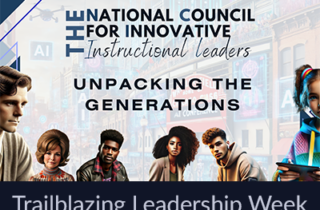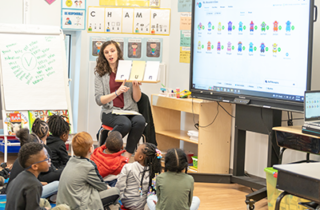Check out the top 2024 edWebinars and edLeader Panels of the year! edWeb presented over 400 new programs in 2024 on so many timely topics in PreK-12 education.
Generation Alpha: Digital natives, visual learners, short attention spans, struggles with face-to-face skills. These are just a few characteristics of the current generation of students that educators must consider as they develop their lessons. But now that AI has become ubiquitous in both home and work environments, administrators need to think about how their schools will integrate AI into their classrooms so that students are prepared for jobs of the future.
“This new generation doesn’t have the same work ethic.” “My grandparents just don’t get the new technology.” It’s common to hear people talk about generations and how they differ from each other. And while administrators should avoid blanket stereotypes, research shows that there are generational trends and attitudes formed by significant events and changes in technology.
There is a reading crisis in America. Reading scores are dropping and 40% of students nationwide don’t read at grade level. Something must urgently be done.
What improves academic skills and heightens student confidence? High-impact tutoring, which can be a game-changer for learning outcomes. When implemented thoughtfully, such programs can have a long-term impact on student achievement.
With the rising number of students who don’t speak English fluently, teachers may struggle to adapt and get new students invested in the learning process. In the edLeader Panel “Supporting Newcomers and Multilingual Learners in Your District,” experts discussed language trends, the difference between language FOR learning and language OF learning, and the key steps for the success of programs aimed at new English language students.
“Uh oh” and “Oh no”—in 2022, that was the typical, collective reaction of administrators and educators to using generative AI in the classroom. From concerns about cheating to students falling behind on essential skills, the initial reaction was extreme apprehension. In 2024, though, schools have started creating policies and guidelines for using generative AI with K-12 students.
A superintendent’s or principal’s role in fostering early literacy extends beyond setting a budget for materials and hiring the right teachers. They play a critical role in setting priorities, providing proper coaching for teachers, and ensuring equitable access. During the edLeader Panel “Supporting Literacy Success as a K-5 Leader,” education leaders detailed key practices for superintendents and principals to ensure effective literacy programs in their schools.
Educators know that getting students engaged is a real challenge. Engagement is down across America, with less than half of high school students feeling engaged. So what is the key to fixing this? The answer is student voice.
The COVID-19 pandemic significantly altered student growth, social development, emotional well-being, future preparedness, and overall behavior. In addition to a slow academic recovery, myriad students are exhibiting behaviors often associated with learning disabilities. The question is whether students’ experiences reflect temporary setbacks or learning needs requiring long-term specialized support.











